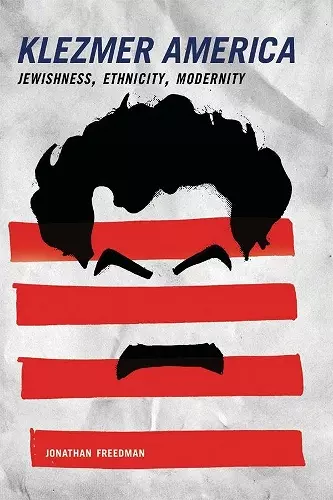Klezmer America
Jewishness, Ethnicity, Modernity
Format:Paperback
Publisher:Columbia University Press
Published:18th Dec '09
Should be back in stock very soon

Jonathan Freedman has scooped us! Klezmer America mobilizes what is indeed a key field of contemporary Jewish creativity and reads it as a key metaphor for the intersections of Jewishness in the politics of American identities. The book is lively, lucid, and inviting. As a lesson in how to talk about Jewish and other collective names, Klezmer America dances deftly above the twin pitfalls of sentimental reification and allegorizing annihilation. -- Jonathan Boyarin, Leonard and Tobee Kaplan Distinguished Professor of Modern Jewish Studies, The University of North Carolina, Chapel Hill By reintroducing Jewishness to the discourse of race and ethnicity in America, Jonathan Freedman challenges rigid categories that have shaped American studies in recent decades. A timely and captivating study, Klezmer America widens and enriches the cultural map of the United States in its exploration of the mutual construction of Jews and 'Other Others.' -- Hana Wirth-Nesher, Samuel L. and Perry Haber Chair on the Study of the Jewish Experience in the United States, and director, Goldreich Institute for Yiddish Language, Literature, and Culture, Tel Aviv University
Klezmer is a continually evolving musical tradition that grows out of Eastern European Jewish culture, and its changes reflect Jews' interaction with other groups as well as their shifting relations to their own history. But what happens when, in the klezmer spirit, the performances that go into the making of Jewishness come into contact with those that build different forms of cultural identity? Jonathan Freedman argues that terms central to the Jewish experience in America, notions like "the immigrant," the "ethnic," and even the "model minority," have worked and continue to intertwine the Jewish-American with the experiences, histories, and imaginative productions of Latinos, Asians, African Americans, and gays and lesbians, among others. He traces these relationships in a number of arenas: the crossover between jazz and klezmer and its consequences in Philip Roth's The Human Stain; the relationship between Jewishness and queer identity in Tony Kushner's Angels in America; fictions concerning crypto-Jews in Cuba and the Mexican-American borderland; the connection between Jews and Christian apocalyptic narratives; stories of "new immigrants" by Bharathi Mukherjee, Gish Jen, Lan Samantha Chang, and Gary Shteyngart; and the revisionary relation of these authors to the classic Jewish American immigrant narratives of Henry Roth, Bernard Malamud, and Saul Bellow. By interrogating the fraught and multidimensional uses of Jews, Judaism, and Jewishness, Freedman deepens our understanding of ethnoracial complexities.
There are some fascinating vignettes in this book. -- Shoel Stadlen Times Literary Supplement always engaging and at time groundbreaking. -- David Brauner Wasafiri
ISBN: 9780231142793
Dimensions: unknown
Weight: unknown
408 pages